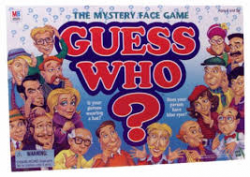Impaired Facial Recognition: Always Playing Guess Who
 As a child I enjoyed playing the Hasbro game “Guess Who” I liked it partly because it was just a game for me. But for a child with Autism most social settings are real live versions of “Guess Who”. While most people understand that people with Autism have difficulty with new social settings, many do not realize a part of this difficulty stems from having difficulty processing faces. Even in settings that are familiar a person with Autism does not always immediately recognize someone who they have seen before. It might take them a few moments or they might even need a specific http://www.varley.net/online/ reminder to help them place that person in their own mind.
As a child I enjoyed playing the Hasbro game “Guess Who” I liked it partly because it was just a game for me. But for a child with Autism most social settings are real live versions of “Guess Who”. While most people understand that people with Autism have difficulty with new social settings, many do not realize a part of this difficulty stems from having difficulty processing faces. Even in settings that are familiar a person with Autism does not always immediately recognize someone who they have seen before. It might take them a few moments or they might even need a specific http://www.varley.net/online/ reminder to help them place that person in their own mind.
There are many studies that have been conducted in recent years detailing what parts of the brain are responsible for facial recognition, and how they work differently in an Autistic person. One of them is: Abnormal adaptive face-coding mechanisms in children with autism spectrum disorder. In it they took 14 boys with high functioning autism and 15 neurotypical boys and compared their facial recognition abilities when different faces were introduced into the test. The Autistic boys had less ability even though they had the same level of concentration as the neurotypical boys.
So how can you help your child with social recognition in social settings? Here are 3 easy tips to help:
1) Find something specific about the person that you and your child can easily spot to help them with recognizing a new person. For example I show my boys that their coaches wear red shirts with white writing. Or how I have pink hair. Both are easily noticeable things that my boys look for first before trying to decipher the faces around them. This means they tend to look at less individual faces when looking for a specific person in a group of people.
2) Having pictures of the people to help them learn the person’s face. Nowadays it’s so common for almost everyone to have a cellphone, and one of its great usages is it’s camera. Simply snap a photo (with the person’s permission) of their face and you can make an album just for your child either on your phone, a family computer or print them and make a story book for them with the person’s name underneath their photo. In print or as an electronic copy; their photo album will give them a tool to utilize much the same as math flash cards to help strengthen their ability to recognize people they will interact with.
3) Talk openly with the people who will be around your child so they understand that your child is not being rude if they don’t greet the person right away. If someone knows that your child has difficulty with facial recognition they will be more understanding in their interactions with your child which in turn will make for more pleasant interactions overall for both your child and the other person. The more people understand the better it is for everyone involved.
With these 3 tips in mind social interactions for your child will be less about playing “Guess Who” and more about actually interacting with others.
References:
The game Guess Who was originally created by Ora and Theo Coster in 1979 and manufactured by Milton Bradley, but is http://printrestaurant.com/online/ now manufactured by Hasbro.
Current Biology: Pellicano E et al. “Abnormal adaptive face-coding mechanisms in children with autism spectrum disorder.” Curr Biol 2007; 17: 1508-1512. A link to the abbreviated works can be found at: http://www.medpagetoday.com/Pediatrics/Autism/6549


